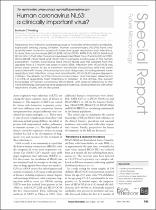| dc.description.abstract | Respiratory tract infection is a leading cause of morbidity and mortality worldwide, especially among young children. Human coronaviruses (HCoVs) have only recently been shown to cause both lower and upper respiratory tract infections. To date, five coronaviruses (HCoV-229E, HCoV-OC43, SARS-CoV, HCoV-NL63 and HCoV HKU-1) that infect humans have been identified, four of which (HCoV-229E, HCoV-OC43, HCoV-NL63 and HCoV-HKU-1) circulate continuously in the human population. Human coronavirus NL63 (HCoV-NL63) was first isolated from the aspirate from a 7-month-old baby in early 2004. Infection with HCoV-NL63 has since been shown to be a common worldwide occurrence and has been associated with many clinical symptoms and diagnoses, including severe lower respiratory tract infection, croup and bronchiolitis. HCoV-NL63 causes disease in children, the elderly and the immunocompromised, and has been detected in 1.0–9.3% of respiratory tract infections in children. In this article, the current knowledge of human coronavirus HCoV-NL63, with special reference to the clinical features, prevalence and seasonal incidence, and coinfection with other respiratory viruses, will be discussed. | en_US |

